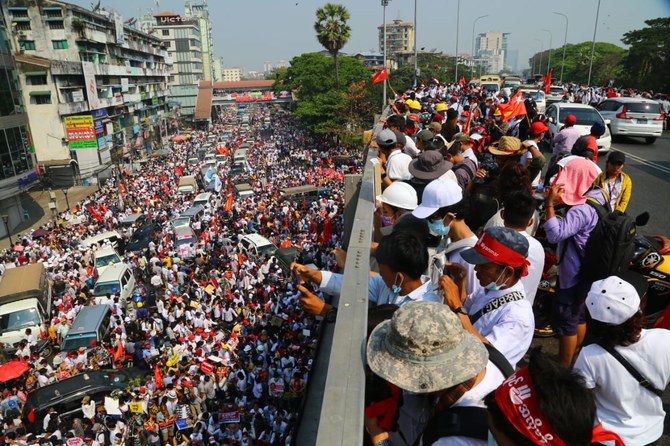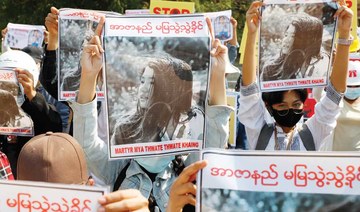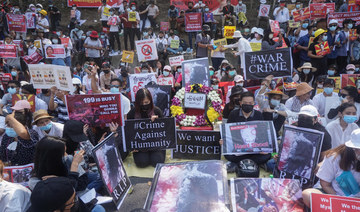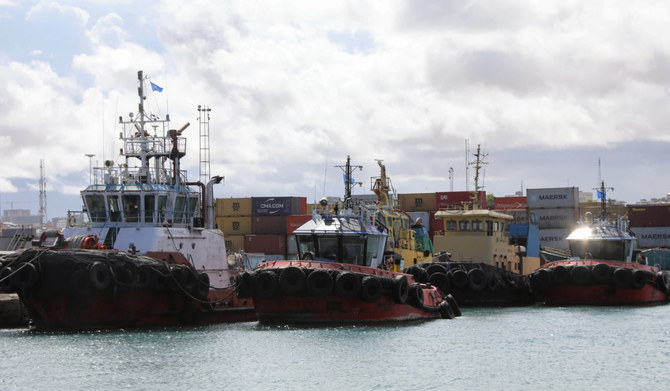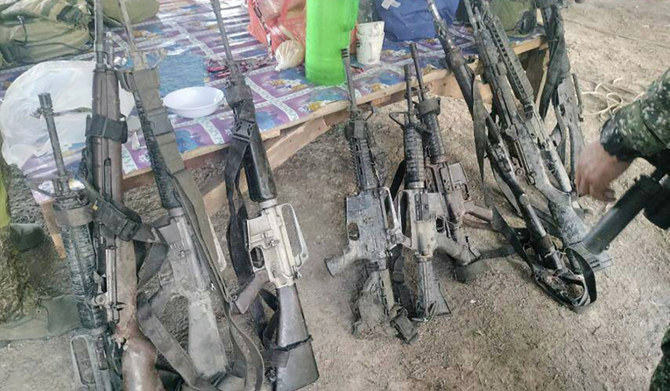YANGON: Tens of thousands of protesters in Myanmar on Monday again took to the streets to demonstrate against the military coup in defiance of warnings from the ruling junta.
In what rally organizers described as one of the biggest public demonstrations in the country’s history, citizens turned out in force to voice their anger despite the deaths of three protesters during a crackdown by troops in recent days.
As military leaders ordered the mobilization of soldiers to quell the latest wave of protests, Wai Yan Phyo Moe, vice chair of the All Burma Federation of Student Unions (ABFSU) and a member of the general strike committee, told Arab News: “Today will be a historic moment, and the demonstration will be the largest ever in our history.”
State-run TV and radio channels repeatedly ran appeals from the military junta urging people not to join the so-called Two Fives Nationwide General Strike (in reference to the five number twos in the date 22/02/2021), warning that “while peaceful demonstrations are lawful, undermining stability is not, and the authorities may take action.”
However, demonstrators said the protests would continue in a show of solidarity for those killed during rallies in Mandalay and the capital Nay Pyi Taw.
“The military coup destroyed our dreams and future overnight. We have nothing to lose anymore. We are therefore determined to take it back with all possible ways,” said protest leader Wai Yan.
Two men were killed over the weekend and more than 20 injured after troops fired shots to disperse mass gatherings in the city of Mandalay. The incidents followed the death of a 20-year-old student who was shot in the head while taking part in anti-coup protests in Nay Pyi Taw.
The military on Monday ordered a nationwide internet blackout to be extended for three hours in Yangon, where police erected barricades to block streets leading to UN offices, and embassies. Armored vehicles, water cannons, and extra troops were also deployed in the city overnight.
Unlike Mandalay and Nay Pyi Taw, Yangon has not yet witnessed any major violence, despite large daily protests.
“All of these acts are to make people scared and confused because they don’t want the two fives movement to happen,” Wai Yan added.
Myanmar has been in a state of unrest since Feb. 1, when military leaders seized power after overthrowing the civilian government led by Aung San Suu Kyi.
The coup followed a landslide win by Suu Kyi’s National League for Democracy (NLD) in the November general election. But the army rejected the results, citing poll irregularities and fraud.
During the takeover, the military detained key government leaders — including Suu Kyi, President Win Myint, and several prominent activists — and declared a state of emergency, along with an announcement that the country would be under military rule for at least a year.
Myanmar has witnessed widespread protests ever since, with thousands ignoring a ban on public gatherings.
“The junta did not learn anything from the past. They thought we are cowards who would bow before the dictator’s sword easily. We are brave and just take non-violence ways of the revolution,” Wai Yan said, referring to the pro-democracy movement of 1988.
Protesters are calling for all civilian leaders to be freed, including Suu Kyi, recognition of the 2020 poll results, and for the military to withdraw from politics.
As protests gathered pace many shops and businesses, including the country’s largest retailer City Mart, remained shut.
Kyin Mya, 56, a Myanmar Chinese woman who had never participated in anti-government protests before, said: “I always told my children not to get involved in politics, but this time it is different.”
Mya, who owns a shop in Yangon’s Lanmandaw township, lost her brother in the 1988 pro-democracy movement, which ended with a brutal crackdown and military coup. She told Arab News: “I can’t hold them anymore. They have tasted freedom over the past few years and are not giving it up easily.
“So, I am also taking to the streets today. I am afraid of being shot or beaten by soldiers, but I told myself we would be together even if we are on the way to taking the bullets.”
Protesters in Yangon made concerted attempts to avoid any confrontations with security forces and unlike on previous days, did not wear T-shirts and headbands bearing the NLD’s symbol, saying their “fight was for democratic values, and not for the NLD.”
In an announcement via state media on Sunday, the military junta said: “NLD members and its supporters have incited protesters to make the hostile behaviors and clashes with the security force members, leading toward a confrontation path.”
But Win Pa Pa, a 31-year-old doctor at a private hospital in Yangon, said: “It is ridiculous. The protests are against dictatorship and across the country from north to south and east to west. All members of religions and ethnicities included. If all protesters are NLD supporters, NLD would have won the 2020 election 100 percent.”
Moe Sandar Myint, founder of the Federation of General Workers Myanmar (FGWM), told Arab News that young but militant labor advocates played a “big role” in the anti-coup protests.
“Tens of thousands of workers are actively involved in the daily protests. We have faced suppression under the civilian governments too but realize that the military rule would make us silent if they rule the country for a longer period,” she said, referring to the junta’s promise to hold an election after one year under a state of emergency.
“Most industrial workers live from hand to mouth. Under the civilian government rule, we could make life better gradually, but there is no way under this dictatorship. It is better to die than live under a dictatorship,” she added.
Accusing the junta of “violating community standards prohibiting the incitement of violence and coordinating harm,” Facebook on Sunday took down the military’s main social media page from its platform.










